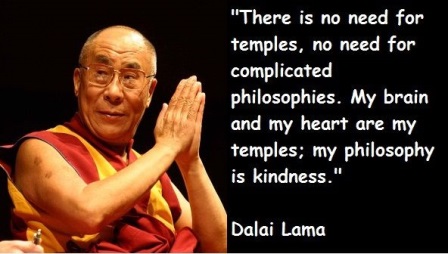
Compassion brings out the best in us. It leads to a fulfilling life and inspires us to make a difference in the world. It is a virtue that you express through acts of kindness and comes to us naturally. Learn how you can cultivate compassion for yourself and others with these steps. (Estimated reading time: 7 minutes)
“Do all the good you can and make as little fuss about it as possible.”
— Charles Dickens
Compassion is a virtue we’ve always aspire towards. Although most people have an intellectual understanding of what it means, they don’t really know in their hearts what it feels like to be compassionate, or why it’s important.
Compassion is much more than a sappy ideology. It’s a way of seeing the world and being part of it. Understanding the suffering of others and wanting to do something about it is what makes us human. Our empathy is a testament to our humanity.
Buddhist texts describe compassion as the ‘quivering of the heart’, in response to the witnessing of suffering. Compassion, translated as ‘karuna’, is defined as active sympathy or a willingness to bear the pain of others. Buddha taught that the path towards enlightenment requires that we develop two qualities: compassion and wisdom.

Empathy gives us the ability to feel and identify with the suffering of others but it doesn’t prompt us to act on those feelings.
Compassion takes empathy to the next level, allowing us to not only understand the challenges that face another person, but also desire to alleviate their pain. It’s proactive and inspires us to serve the greater good.
In the past, religion and philosophy influenced people to maintain a strict moral code guided by their conscience. Institutions instilled a sense of responsibility within people when it came to serving their communities.
The modernization of humanity has diminished the importance of these guideposts and replaced it with the capitalist credo of achieving material success.
In addition to the quest for personal gain, competition for jobs and resources is growing as the population of the planet continues to increase, driving a need to protect our own interests. We’re preoccupied with how we can keep our ships afloat in a sea of chaos, uncertainty and change.

The good news is that we all have the capacity to eliminate this egocentric mindset. We can override our fear and distrust of others and replace it with understanding and empathy. Compassion can be learned.
As humans we’re instinctually wired to feel compassionate towards others. We can choose to train our minds and hearts to feel it constantly.
Research has confirmed that traits such as compassion and altruism are not fixed and can be cultivated with practice and training. A report published by Psychological Science found that training adults to engage in compassion meditation, a traditional Buddhist technique, resulted in more altruistic behavior and a change in the neural systems of the brain.
Helen Weng, the lead author of the study said:
“People seem to become more sensitive to other people’s suffering, but this is challenging emotionally. They learn to regulate their emotions so that they approach people’s suffering with caring and wanting to help rather than turning away. We found that activity was increased in the inferior parietal cortex of the brain, a region involved in empathy and understanding others, during and after the meditation”
Treating others with compassion is a gift of immeasurable value. Being the recipient of a compassionate act however, can feel life changing. Think of a time in your life when someone reached out to you and showed that they cared. Can you remember how it made you feel?
In my own life I remember a time when I had worked tireless to be elected to the school prefect board. This was a great honor, and I was desperate to please my seniors, wanting nothing more in the world.
When the elected prefects were announced and my name was not called I was devastated. A friend turned to me in that moment and gently put her arm around me. “Seline,” she said, “I know how much this meant to you but you have to know that you don’t need a badge to be special.”
Those words meant the world to me and planted the seed for my own journey of compassion. It inspired me to not only be more compassionate towards others but to myself as well. I felt a pressing need to take a step back and re-examine how I’d been treating others and myself.

Compassion must first start with us. It’s only when we respond to our own suffering that we’ll be willing to alleviate the suffering of others. Buddhist teacher Pema Chödrön said, “Sorrow has the exact same taste for all of us.” When we truly see our own suffering we are able to recognize it in others.
We’re all human beings sharing a common experience on Earth. We all need food, shelter and a sense of belonging. We all experience fear, doubts and face uncertainty. We all crave recognition, happiness and peace. When you reflect on these commonalities and play down the differences it’s easier to feel compassion to those who seem different from us.
The key to developing compassion is to make it a daily practice. You can send out vibrations of love throughout your day by simply meditating on it during your routines, when you interact with others and when you reflect on the current state of the world. Every single thing you think, say and do matters and has the power to alter your mindset and your interactions.
Here are five steps to cultivate compassion:
1. Show yourself compassion first: Most of us tend to be hard on ourselves. We are our own worst critics. If left unchecked this self-criticism can ruthlessly highlight our imperfections making us feel like we’re never good enough. We can tame our inner critic by engaging in a constant practice of self-care where we can attend to our needs. It’s only when we love ourselves that we can truly offer compassion to others. Prioritize yourself, and nurture your self-confidence.
2. Listen without judgement: You can hear the truth behind words when you’re able to fully listen to what others are saying. Avoid interrupting, judging and projecting your own preconceptions onto what they are trying to convey to you. Once you deal with your own assumptions and let go of any self-judgments, it will be easier to disengage from dualistic thinking, no longer seeing things as black and white. You’ll be less inclined to label everything as “right or wrong” or “good or bad”.
3. Be fully present and step outside your ego: To be fully present with someone you must be willing to step outside of your ego. We have to be tuned into the interconnectedness of all things and refrain from the assumption that we are the center of the universe. Expand your awareness and move beyond the surface barriers that separate you from everyone else and plug into the oneness of the human collective system. When you find yourself judging another individual, try repeating the Sanskrit affirmation “Tat Tvam Asi” which translates to “You are that”. Envision their face and see them through your mind’s eye as you repeat this mantra.
4. Be willing to put yourself in others shoes: Accept that the world looks different through the lens of others based on their backgrounds, genetic predispositions and personal experiences. I know that this is especially hard when you disagree with someone, but let your curiosity override your urge to criticize. Be willing to ask questions to get deeper insights into the personal perspective of others instead of belittling their thoughts and opinions. From this benevolent state of mind you’ll be better able to hold them with compassion in your heart and feel sympathetic towards their foibles and personal struggles. Remember that life is hard and everyone is doing the best that they can. As Plato once said, “be kind, for everyone you meet is fighting a hard battle.”
5. Say a silent prayer for those around you: You’re capable of evoking compassion for anyone at anytime during your day. You can do it in public, at a train station, airport, park or a waiting room in a hospital. Gaze at the people around you and reflect on the reality that each one of them is facing a variety of problems in their life. Maybe they have a pressing health concern or they are suffering from heartache after the loss of a loved one? Perhaps they’re facing career and financial difficulties? Although the specific challenges are unknown to you in the moment, it’s safe to assume that each one applies to someone out there. Silently wish them well and send them loving thoughts to heal their pain.
The Dalai Lama said, “the problems of the world – social, economic, environmental, and so on – are best understood and viewed through the lens of compassion.” Our empathy for the suffering of others will encourage altruistic acts which will spread more peace and hope to the human race.
All my best on your journey,
Seline

Question for you: Do you believe it’s possible to cultivate passion for yourself and others? If not, what could be potentially blocking you?
Did you like this post? Sign up below and I’ll send you more awesome posts like this every week.

Hello seline
My problem is not that i don’t feel compassion for others- its that I feel too much compassion for others and not enough for myself. I will bend over backwards to help my family friends or even strangers in need but I will ignore myself and fail to take care of my own needs. Its the way I have always been even as a kid- but it gets hard at times to be like this….thanks!